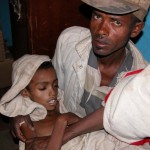
A Novel Tropically Stable Oral Amphotericin B Formulation (iCo-010) Exhibits Efficacy against Visceral Leishmaniasis in a Murine Model was published today in PLoS Neglected Tropical Diseases online journal.
A new formulation of Amphotericin B (AmB) developed by University of British Columbia researchers has been shown to be stable in tropical climates and effective in treating Visceral Leishmaniasis (VL) in mouse models.
VL is a blood-born parasitic disease that afflicts 12 million people worldwide, mainly in developing countries and tropical regions. According to the World Health Organization (WHO), 1.5 million new cases of the disease are reported every year, and 60,000 people die from it.
AmB, a 50-year-old anti-fungal drug, is the standard treatment for VL, but its current formulation requires intravenous administration and constant refrigeration, making it costly and challenging to deliver in tropical regions, where VL takes the heaviest toll.
A lipid-based formulation, co-developed by UBC Pharmaceutical Sciences Professor Kishor Wasan and Adjunct Professor Ellen Wasan, allows the drug to be taken orally. It was licensed to Vancouver-based iCo Therapeutics in 2008. As part of the licensing agreement, and in accordance with UBC’s Global Access principles, iCo Therapeutics agrees to provide the drug at subsidized costs to developing countries for the treatment of VL.
A new study published today in the online journal PLoS Neglected Tropical Diseases shows that the formulation, called iCo-010, is stable in WHO Climate Zones 3 and 4 (30-43 degrees Celcius) and is efficacious in treating mice with VL.
In most places where VL is a problem, there is little infrastructure for refrigeration of drug products,” says Kishor Wasan, Distinguished University Scholar and co-author of the study. “Now we’ve shown for the first time this lipid-based formulation can stand up to the harsh conditions of the tropical climate and is effective in animal models when taken orally.”

©Alvar Jorge:
The development of this thermally stable and efficacious oral formulation brings us one step closer to helping people in remote areas of India, Bangladesh, Nepal and Sudan, where VL is a serious problem,” says Ellen Wasan, lead author of the PLoS-NTD paper. Ellen Wasan is an adjunct professor at UBC’s Faculty of Pharmaceutical Sciences and a faculty member at the British Columbia Institute of Technology.
The AmB oral formulation is a founding project of the Neglected Global Diseases Initiative (NGDI) at UBC and is funded by the Consortium for Parasitic Drug Development, a grantee of the Bill and Melinda Gates Foundation. Since its launch in 2009, NGDI-associated researchers have received more than $9 million in funding for projects aimed at improving health outcomes for the world’s poorest people.
The Neglected Global Diseases Initiative at UBC
For more information contact:
Brian Lin
UBC Public Affairs
Tel: 604.822.2234
Cell: 604.818.5685
Email: brian.lin@ubc.ca